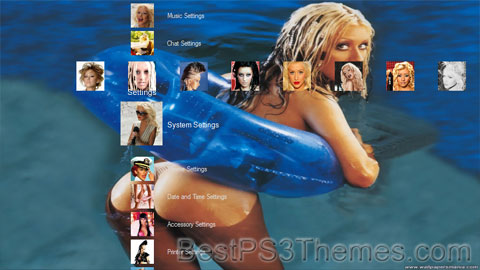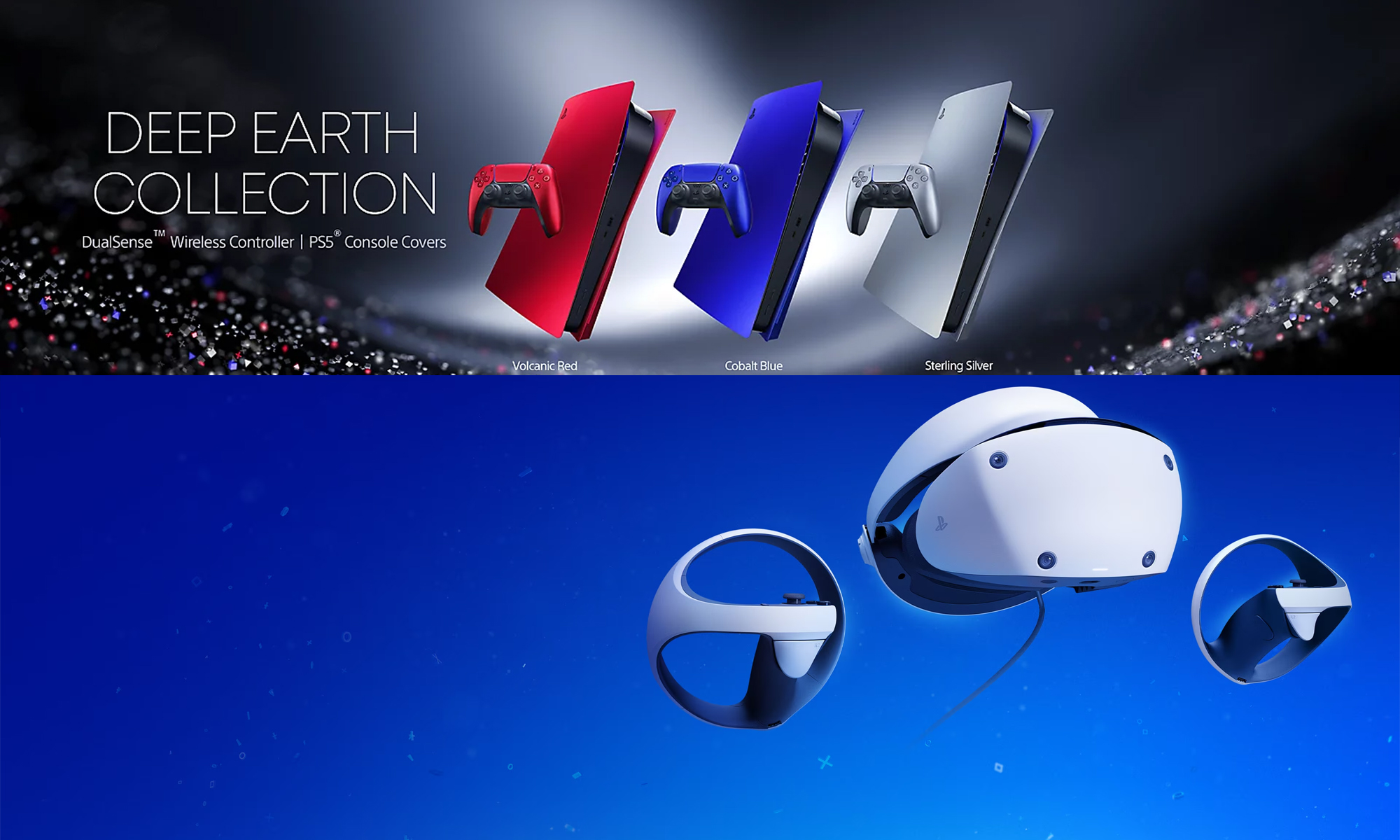Christina Aguilera theme by Jana
Download: ChristinaAguilera_2.p3t

(9 backgrounds)
Christina Aguilera | |
|---|---|
 Aguilera in 2023 | |
| Born | Christina María Aguilera December 18, 1980 New York City, US |
| Other names |
|
| Occupations |
|
| Years active | 1993–present |
| Organization | |
| Works | |
| Spouse |
Jordan Bratman
(m. 2005; div. 2011) |
| Partner | Matthew Rutler (eng. 2014) |
| Children | 2 |
| Awards | Full list |
| Musical career | |
| Genres | |
| Instruments | Vocals |
| Labels | |
| Website | christinaaguilera |
| Signature | |
 | |
Christina María Aguilera (/ˌæɡɪˈlɛərə/ AG-il-AIR-ə, Spanish: [kɾisˈtina maˈɾi.a aɣiˈleɾa];[1] born December 18, 1980) is an American singer, songwriter, actress, and television personality. Referred to as the "Voice of a Generation", she is noted for her four-octave vocal range, musical reinventions, sustaining high notes including use of the whistle register, and a signature use of melisma throughout her music. Recognized as an influential figure in popular music, she also became known for incorporating controversial themes such as feminism, sexuality, LGBT culture and the sex-positive movement into her work. Aguilera was also honoured as a Disney Legend, for her contributions to The Walt Disney Company.
After appearing on The All-New Mickey Mouse Club (1993–1994) as a child, Aguilera recorded "Reflection", the theme for the 1998 animated film Mulan and signed a record deal with RCA Records. She rose to fame in 1999 with her self-titled debut album and the US Billboard Hot 100 number-one singles, "Genie in a Bottle", "What a Girl Wants" and "Come On Over Baby (All I Want Is You)". Aguilera also won the Grammy Award for Best New Artist and followed with Mi Reflejo (2000) and My Kind of Christmas (2000); with the former becoming the best-selling Latin pop album of 2000. After gaining more control over her career, Aguilera sought a departure from her teen idol image and released Stripped (2002), which initially had a mixed response. The album later became one of the best-selling albums of the 21st century. Aguilera underwent another reinvention with the release of the critically praised old-school-music inspired Back to Basics (2006). Throughout these periods, she amassed numerous international successes, including the number-one single "Lady Marmalade", alongside "Beautiful", "Dirrty", "Can't Hold Us Down", "Fighter", "Ain't No Other Man" and "Hurt".
Throughout the early 2010s, Aguilera had a moderately successful period with the albums Bionic (2010) and Lotus (2012), with their respective lead singles, "Not Myself Tonight" and "Your Body", topping the US Dance Club Songs chart. She also starred in the 2010 film Burlesque and contributed to its soundtrack, earning a Golden Globe Award nomination. Aguilera returned to the top of the charts with a string of collaborations, including "Feel This Moment", "Say Something", and "Moves like Jagger"; with the latter reaching number-one on the Hot 100, making Aguilera one of the few artists to reach the top spot over three decades. She found critical success with her follow-up albums Liberation (2018) and Aguilera (2022). Her concurrent ventures included a role in the series Nashville (2015), roles in the films The Emoji Movie (2017) and Zoe (2018), becoming an ambassador for the World Food Programme (WFP), performing two concert residencies, co-founding the company Playground, and serving as a coach on the reality competition show The Voice (2011–2016).
Aguilera is one of the best-selling music artists of all time, with estimated sales of over 90 million records sold worldwide.[2] Considered a pop culture icon and a triple threat entertainer, she has been named one of the greatest vocalists of all time by publications such as Rolling Stone and Consequence of Sound and has been hailed as one of the most successful artists to come out of the 2000s. In 2009, Billboard named her the twentieth most successful artist of the decade, and was ranked eighth on VH1's list of greatest women in music. Aguilera has since been regarded as one of the most influential Latin artists in the entertainment industry, having helped shape the "Latin explosion" in the music industry. Her accolades include five Grammy Awards, two Latin Grammy Awards, six ALMA Awards, two MTV Video Music Awards (VMA), one Billboard Music Award, one Guinness World Record, and a star on the Hollywood Walk of Fame.
Early life and education[edit]
Christina María Aguilera was born on December 18, 1980, in New York City, to Shelly Loraine (née Fidler) and Fausto Wagner Xavier Aguilera.[3] Her father is an Ecuadorian emigrant from Guayaquil while her mother has German, Irish, Welsh, and Dutch ancestry.[4][5] Fausto Aguilera was a United States Army sergeant, and Shelly Loraine was a violinist in the American Youth Symphony before becoming a Spanish translator.[6][7]
Due to Fausto's military service, Aguilera's family moved frequently, living in New Jersey and Texas.[8] In 1983, they moved to Japan and lived in Sagamihara for at least two years.[9] During her youth in Pittsburgh metropolitan area, Aguilera attended North Allegheny Intermediate High School before leaving there to be homeschooled to avoid bullying she experienced at school.[10][11]
In 1986, the family returned to the United States, and settled in Pennsylvania, where they welcomed her younger sister, Rachel, in 1986.[12] Aguilera has spoken out about her father's physically and emotionally abusive behavior.[13] She noted that this is what made her turn to music, noting that, "growing up in an unstable environment and whatnot, music was my only real escape".[14] In 1987, Shelly filed to divorce Fausto and moved with Aguilera and Rachel to her mother's home in Rochester, a suburb of Pittsburgh.[15] She later married James Kearns with whom she had a son named Michael.[16] In 2012, following decades of estrangement, Aguilera expressed interest in reconciling with her biological father.[17]
Aguilera moving to her grandmother's home allowed her to explore her grandmother's records, which featured mostly soul and blues singers and increased her interest in music.[18] She also began to practice singing in public and competing in talent contests.[19] Following numerous contests, she earned reputation in her neighborhood as the "little girl with a big voice" and received widespread attention from local television and radio programs.[20][21]
In 1990, she performed the popular song "A Sunday Kind of Love" on the reality competition show Star Search, but was eliminated during the semi-final round.[22] Aguilera was eventually invited to sing "The Star-Spangled Banner" before Pittsburgh Penguins hockey, Pittsburgh Steelers football, and Pittsburgh Pirates baseball games, and at the 1992 Stanley Cup Finals.[23][24]
Career[edit]
1993–1998: Career beginnings[edit]
In 1991, Aguilera auditioned for a position on The All-New Mickey Mouse Club (MMC), aired on the Disney Channel. She ran against 400 candidates, and while she made the shortlist she was ultimately rejected for not meeting the minimum age requirement.[25] One year later, in 1992, Aguilera received a call from one of the show's producers asking if she was still interested in becoming a "Mouseketeer". She once again competed for a spot (this time, against 15,000 candidates) and was selected to join the variety program the following year.[26] Her fellow cast members included Ryan Gosling, Keri Russell, Britney Spears, and Justin Timberlake.[27] During the show recordings—which included Aguilera performing musical numbers and comedy sketches—she moved with her family to Orlando, Florida.[28] In 1994, it was reported the series would not return for a new season.[29]
Aiming to begin a music career, Aguilera moved to Japan in 1997. She was selected to record a duet with Japanese singer Keizo Nakanishi, with whom she performed in concert shows around the country.[30] Their song, "All I Wanna Do", was released as a single but failed to reach commercial success.[20] In June 1997, Aguilera went on to Romania to represent the United States in a singers contest during the Golden Stag Festival, but she failed to win over the audience.[31]
Seeking a recording contract, Aguilera recorded numerous demo tapes directed to record labels, including Walt Disney Records, for which she sent a cover of "Run to You" by Whitney Houston.[32] She eventually was chosen to record "Reflection", the theme song from the animated film Mulan (1998), which reached number 15 on the Billboard Adult Contemporary chart.[33] Following the attention she received with "Reflection", Aguilera caught the ear of Ron Fair, the A&R executive from RCA Records, who consequently signed Aguilera to the label.[8] In late 1998, she began to record her debut studio album into which producers reportedly invested over $1 million worth of writers, producers and vocal lessons.[8]
1999–2001: Breakthrough with debut album[edit]
In May 1999, Aguilera released "Genie in a Bottle", the lead single off her long-awaited debut album, which topped the Billboard Hot 100 for five consecutive weeks and became the second best-selling single of 1999.[34] The song became an international success, increasing Aguilera's popularity worldwide, topping the charts in over 20 countries.[35] The single also attracted the attention of conservatives including celebrities such as Debbie Gibson that spoke out against its lyrical content, and was eventually considered "too provocative" to be sung by a teen idol.[36][37] Due to the criticism, Radio Disney replaced the song with a censored version.[38] The song was nominated for a Grammy Award for Best Female Pop Vocal Performance.[39]
Aguilera's self-titled debut album, Christina Aguilera, was released on August 24, 1999, to critical praise, debuting at number one on the Billboard 200.[40] It catapulted Aguilera into fame globally and sold over ten million copies in its first year.[41] It was later certified eight times platinum by the Recording Industry Association of America (RIAA),[42] and it has sold over 17 million copies worldwide.[43][44] Originally, Aguilera's desire was to create material directly inspired by R&B and soul, but the label opted for a more teen pop production due the genre's high financial return in the late 1990s.[45] At the 42nd Annual Grammy Awards, Aguilera won the Best New Artist category for which Time credited the award for "[helping] certify her credentials as a real singer".[46]
I was completely blown away, shocked, overwhelmed and thrilled. I didn't expect it. I've dreamed of that since I was eight years old. I was rambling off the top of my head, my knees were shaking and I'm still floating on air because of it!
—Aguilera on winning Best New Artist at the 42nd Annual Grammy Awards.[47]
After the album's release, "What a Girl Wants", topped the Hot 100 and is recognised as the first new number one entry on the chart for the 2000's decade.[48] The song was also nominated for Best Female Pop Vocal Performance at the 43rd Annual Grammy Awards.[48] This was followed with "I Turn to You" which reached number three there,[40] and "Come On Over Baby (All I Want Is You)" which became Aguilera's third number one song and achieved worldwide success.[49] She also released a cover of "The Christmas Song" in November 1999 which peaked at number 18 and became the second highest charting position of the song after the original in 1944.[50]
In May 2000, Aguilera embarked on her debut concert tour, Christina Aguilera in Concert, which toured North America, Latin America, Europe, and Japan until February 2001.[51][52] Her success continued to rise with the release of her second studio album, Mi Reflejo, in September 2000 which topped both the Billboard Top Latin Albums and Latin Pop Albums for nineteen consecutive weeks.[53] The album featured Spanish-language versions of several songs from her debut album along with new songs, and had Latin pop themes.[54] Three singles were release for the album including the Spanish version of "Come On Over Baby (All I Want Is You)" titled "Ven Conmigo (Solamente Tú)", "Pero Me Acuerdo de Ti" and "Falsas Esperanzas".[55] The latter two were performed at the 43rd Annual Grammy Awards.[56] The album went on to be the best-selling Latin pop album of 2000 and was later certified six times Latin platinum by the RIAA.[28][57] Mi Reflejo also reached the platinum stats in Argentina, Mexico, and Spain.[58] At the 2nd Annual Latin Grammy Awards, the album won Best Female Pop Vocal Album.[59]
In October 2000, Aguilera also released her third studio album, My Kind of Christmas, her first Christmas album, which reached number one on the US Top Holiday Albums chart.[60][61] The album received generally polarized reviews at the time but has since gone on to retrospectively receive praise.[62] Aguilera starred in a holiday special, My Reflection, which aired on December 3, 2000, on ABC.[63] Aguilera's commercial success saw her being named the 2000 Top Female Pop Act by Billboard.[64] The same year, she also filed a fiduciary duty against manager Steve Kurtz for "improper, undue, and inappropriate influence over her professional activities".[65] She eventually hired Irving Azoff to manage her career, aiming for control of her career and image.[65]
On January 16, 2001, Aguilera featured on Ricky Martin's "Nobody Wants to Be Lonely", which topped charts internationally and peaked at number 13 on the Hot 100, becoming her fifth top-20 hit in the US.[66][67] The song was ranked at number 65 on VH1's "100 Greatest Love Songs",[68] and was nominated for Best Pop Collaboration with Vocals at the 44th Annual Grammy Awards.[69] In April of that year, Aguilera featured alongside Lil' Kim, Mýa, and Pink on "Lady Marmalade" from the soundtrack for the film, Moulin Rouge! (2001).[70] The song received positive reviews and topped the Hot 100 for five consecutive weeks, becoming Aguilera's fourth number one.[71][72] The song also won the Grammy Award for Best Pop Collaboration with Vocals and the MTV Video Music Award for Video of the Year.[73]
In August 2001, Warlock Records released Just Be Free, a demo album recorded by Aguilera between 1994 and 1995 while she was looking for a recording deal following the end of The All-New Mickey Mouse Club (MMC).[74] She filed a suit against the label and the album's producers aiming to stop the release of the album; however, both parties came to a confidential settlement to release the album, in which Aguilera lent out her name, likeness, and image for an unspecified amount of damages.[75]
2002–2004: New image with Stripped[edit]
With a new management, Aguilera started moving away from her teen pop niche and began working on a new project.[76] She cultivated a new image by adopting the alter ego Xtina, dyeing her hair black, and sporting several tattoos and body piercings.[77] Aguilera's new persona was widely criticized by media outlets.[78][79][80] In September 2002, she released the controversial song, "Dirrty", which garnered mixed reviews and peaked as number 48 on Billboard Hot 100.[45] The song's accompanying music video generated controversy for depicting overtly sexual fetishes,[81] and attracted the attention of conservative organizations and moralists who sought to have the video banned on MTV.[82] The video also sparked protests in Thailand and was eventually banned on the country's local television.[83][84] "Dirrty" topped the charts in the UK and Ireland,[85] and has gone on to become a cult classic.[86]

